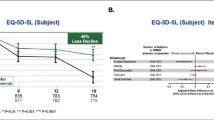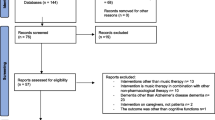Abstract
Background
Public awareness for dementia is rising and patients with concerns about forgetfulness are not uncommon in general practice. For the general practitioner (GP) subjectively perceived memory impairment (SMI) also offers a chance to broach the issue of cognitive function with the patient. This may support GPs’ patient-centered care in terms of a broader frailty concept.
Objective
What is SMI (definition, operationalization, prevalence and burden)? Which conceptions and approaches do GPs have regarding SMI?
Methods
Narrative overview of recent SMI criteria and results, selective utilization of results from a systematic literature search on GP dementia care, non-systematic search regarding SMI in general practice, deduction of a study design from the overview and development according to international standards.
Results
Studies revealed that approximately 60% of GP patients aged >74 reported a declining memory, every sixth person had concerns about this aspect and only relatively few seek medical advice. Concerns about SMI are considered a risk factor for future dementia. Specific general practice conceptions about SMI could not be identified in the literature. Using guidelines for mixed methods research, the design of an exploratory sequential mixed methods study is presented, which should reveal different attitudes of GPs towards SMI.
Conclusion
Subjective memory impairment (SMI) is a common feature and troubles a considerable proportion of patients. Neuropsychiatric research is progressing, but for the transfer of the SMI concept into routine practice, involvement of GP research is necessary. A new study aims to make a contribution to this.
Zusammenfassung
Hintergrund
Die öffentliche Aufmerksamkeit für Demenz wächst; in der Hausarztpraxis kann sich dies in Sorgen der PatientenInnen um das eigene Gedächtnis äußern. Für den Hausarzt/die Hausärztin bieten solche patientenseitig wahrgenommenen Gedächtnisprobleme („subjective memory impairment“, SMI) u. a. die Möglichkeit, ein Gespräch über das Gedächtnis zu führen. Dies kann die hausärztliche Versorgung im Sinne eines erweiterten Frailty-Konzepts unterstützen.
Fragestellung
Was ist SMI (Definition, Operationalisierung, Prävalenz, Bedeutung)? Welche Konzepte von SMI und Umgangsstrategien mit SMI haben Hausärzte/-ärztinnen?
Methoden
Narrative Übersicht aktueller SMI-Kriterien und -Daten; selektive Nutzung der Ergebnisse einer systematischen Literaturrecherche zur hausärztlichen Demenzversorgung; nicht-systematische Recherche zu SMI in der Hausarztpraxis; Ableitung eines Studiendesigns aus der Literaturübersicht und Entwicklung anhand internationaler Standards.
Ergebnisse
Laut Studienlage geben ca. 60 % der HausarztpatientInnen im Alter >74 ein nachlassendes Gedächtnis an. Sorgen darüber macht sich jeder Sechste; weitaus weniger suchen aktiv ärztlichen Rat. Sorgen um SMI gelten als Risikofaktor für eine spätere Demenz. Spezifisch hausärztliche SMI-Konzepte konnten in der Literatur nicht gefunden werden. Anhand von Standards für Forschung mit kombinierter qualitativer und quantitativer Methodik wird das Design einer exploratorischen sequenziellen „Mixed-methods“-Studie dargestellt, die über die verschiedenen Einstellungen zu SMI unter Hausärzten/-ärztinnen Aufschluss geben soll.
Diskussion
„Subjective memory impairment“ ist häufig und beunruhigt einen deutlichen Teil der PatientenInnen. Die neuropsychiatrische Forschung zu SMI geht voran. Für die Umsetzung des Konzepts in die Praxis ist jedoch die Beteiligung allgemeinmedizinischer Forschung unabdingbar. Eine neue Studie soll dazu beitragen.



Similar content being viewed by others
References
DAK (2014) Angst vor Krankheiten. Forsa. https://www.dak.de/dak/download/Studie_Angst_vor_Krankheiten-1523026.pdf. Accessed 02 Dec 2016
Herwig H, von Hülsen-Esch A (2016) Alte im Film und auf der Bühne. transcript, Bielefeld
Kelaiditi E, Cesari M, Canevelli MV et al (2013) Cognitive frailty: rational and definition from an (IANA/IAGG) international consensus group. J Nutr Health Aging 17:726–734
Grant MJ, Booth A (2009) A typology of reviews: an analysis of 14 review types and associated methodologies. Health Info Libr J 26:91–108
Leve V, Vollmar HC, Michel JV et al (2014) Wie bildet sich ein theoretisches Einstellungsmodell zur Demenz in der hausärztlichen Versorgungsrealität ab? [abstract]. GMS Publishing House, Düsseldorf (Doc14degam160)
Jessen F (2007) Sind subjektive Gedächtnisstörungen ein Prodromalsyndrom der Demenz? Nervenheilkunde 26:659–661
Mitchell AJ (2008) Is it time to separate subjective cognitive complaints from the diagnosis of mild cognitive im-pairment? Age Ageing 37:497–499
Iliffe S, Pealing L (2010) Subjective memory problems. BMJ 340:c1425
Cutler SJ (2015) Worries about getting Alzheimer’s: who’s concerned? Am J Alzheimers Dis Other Demen 30:591–598
Rabin LA, Smart CM, Crane PK et al (2015) Subjective cognitive decline in older adults: an overview of self-report measures used across 19 international research studies. J Alzheimers Dis 48(Suppl 1):S63–S86
Burmester B, Leathem J, Merrick P (2015) Assessing subjective memory complaints: a comparison of spontaneous reports and structured questionnaire methods. Int Psychogeriatr 27:61–77
Archer HA, Newson MA, Coulthard EJ (2015) Subjective memory complaints: symptoms and outcome in different research settings. J Alzheimers Dis 48(Suppl 1):109–114
Commissaris CJ, Pondson RW, Jolles J (1998) Subjective forgetfulness in a 9 normal Dutch population: possibilities for health education and other interventions. Patient Educ Couns 34:25–32
Jonker C, Geerlings MI, Schmand B (2000) Are memory complaints predictive 3 for dementia? A review of clinical and population-based studies. Int J Geriatr Psychiatry 15:983–991
Larrabee GJ, Crook TH III (1994) Estimated prevalence of age-associated memory impairment derived from standardised tests of memory function. Int Psychogeriatr 6:95–104
Jessen F, Wiese B, Cvetanovska G et al (2007) Patterns of subjective memory impairment in the elderly: association with memory performance. Psychol Med 37:1753–1762
Begum A, Dewey M, Hassiotis A, Prince M, Wessely S, Stewart R (2014) Subjective cognitive complaints across the adult life span. Psychol Med 44:1977–1987
Hurt CS, Burns A, Brown RG, Barrowclough C (2012) Why don’t older adults with subjective memory complaints seek help? Int J Geriatr Psychiatry 27:394–400
Pearman A, Storandt M (2005) Self-discipline and self-consciousness predict subjective memory in older adults. J Gerontol B Psychol Sci Soc Sci 60:P153–P157
Comijs HC, Deeg DJ, Dik MG, Twisk JW, Jonker C (2002) Memory complaints: the association with psycho-affective and health problems and the role of personality characteristics. J Affect Disord 72:157–165
Hill NL, Mogle J, Wion R et al (2016) Subjective cognitive impairment and affective symptoms: a systematic review. Gerontologist. doi:10.1093/geront/gnw091
Crumley JJ, Stetler CA, Horhota M (2014) Examining the relationship between subjective and objective memory performance in older adults: a meta-analysis. Psychol Aging 29:250–263
Mitchell AJ (2008) The clinical significance of subjective memory complaints in the diagnosis of mild cognitive impairment and dementia: a meta-analysis. Int J Geriatr Psychiatry 23:1191–1202
Mitchell AJ, Beaumont H, Ferguson D, Yadegarfar M, Stubbs B (2014) Risk of dementia and mild cognitive impairment in older people with subjective memory complaints: meta-analysis. Acta Psychiatr Scand 130:439–451
Jessen F, Wiese B, Bachmann C et al (2010) Prediction of dementia by subjective memory impairment: Effects of severity and temporal association with cognitive impairment. Arch Gen Psychiatry 67:414–422
Mendonça MD, Alves L, Bugalho P (2016) From subjective cognitive complaints to dementia: who is at risk? A systematic review. Am J Alzheimers Dis Other Demen 31:105–114
Jessen F, Amariglio RE, van Boxtel M et al (2014) A conceptual framework for research on subjective cognitive decline in preclinical Alzheimer’s disease. Alzheimers Dement 10:844–852
Reid LM, MacLullich AM (2006) Subjective memory complaints and cognitive impairment in older people. Dement Geriatr Cogn Disord 22:471–485
Begum A, Morgan C, Chiu CC et al (2012) Subjective memory impairment in older adults: aetiology, salience and help seeking. Int J Geriatr Psychiatry 27:612–620
Pusswald G, Moser D, Pflüger M et al (2016) The impact of depressive symptoms on health-related quality of life in patients with subjective cognitive decline, mild cognitive impairment, and Alzheimer’s disease. Int Psychogeriatr. doi:10.1017/S1041610216001289
Phillipson L, Magee C, Jones S, Reis S, Skaldzien E (2015) Dementia attitudes and help-seeking intentions: an investigation of responses to two scenarios of an experience of the early signs of dementia. Aging Ment Health 19:968–977
Begum A, Whitley R, Banerjee S, Matthews D, Stewart R, Morgan C (2013) Help-seeking response to subjective memory complaints in older adults: toward a conceptual model. Gerontologist 53:462–473
Croisile B, Rothoft JM (2004) Memory complaints in general practitioners: presentation and management. Revue Geriatr 29:179–188
Pentzek M, Fuchs A, Wiese B, Abholz HH (2010) Which information do GPs use to rate the cognitive status of elderly non-demented patients? Psychiatr Prax 37:377–383
Van Hout H, Vernooij-Dassen M, Bakker K, Blom M, Grol R (2000) General practitioners on dementia: tasks, practices and obstacles. Patient Educ Couns 39:219–225
Iliffe S, Wilcock J (2005) The identification of barriers to the recognition of, and response to, dementia in primary care using a modified focus group approach. Dementia 4:73–85
Boise L, Camicioli R, Morgan DL, Rose JH, Congleton L (1999) Diagnosing dementia: perspectives of primary care physicians. Gerontologist 39:457–464
Wollny A, Fuchs A, in der Schmitten J, Altiner A, Pentzek M (2010) Between closeness and distance: Family practitioners’ perception of persons with dementia. Z Allg Med 86:425–434
O’Cathain A, Murphy E, Nicholl J (2008) The quality of mixed methods studies in health services research. J Health Serv Res Policy 13:92–98
O’Brien BC, Harris IB, Beckman TJ, Reed DA, Cook DA (2014) Standards for reporting qualitative research: a synthesis of recommendations. Acad Med 89:1245–1251
Bennett C, Khangura S, Brehaut JC et al (2011) Reporting guidelines for survey research. PLOS Med 8:e1001069
Creswell JW, Fetters MD, Ivankova NV (2004) Designing a mixed methods study in primary care. Ann Fam Med 2:7–12
Jovchelovitch S, Bauer MW (2000) Narrative Interviewing. In: Bauer MW, Gaskell G (eds) Qualitative research with text, image and sound. Sage, Thousand Oaks, pp 57–74
Küsters I (2006) Narrative Interviews. VS Verlag, Wiesbaden
Lamnek S (2010) Qualitative Sozialforschung. Beltz, Weinheim
Hsieh HF, Shannon SE (2005) Three approaches to qualitative content analysis. Qual Health Res 15:1277–1288
Mayring P (2010) Qualitative Inhaltsanalyse: Grundlagen und Techniken. Beltz, Weinheim
Hair JFJ, Anderson RE, Tatham RL, Black WC (1995) Multivariate data analysis. Prentice Hall, Saddle River
Pit SW, Vo T, Pyakurel S (2014) The effectiveness of recruitment strategies on general practitioner’s survey response rates – a systematic review. BMC Med Res Methodol 14:76
Knollmann M, Reissner V, Kiessling S, Hebebrand J (2013) The differential classification of school avoidance – a cluster-analytic investigation. Z Kinder Jugendpsychiatr Psychother 41:335–345
Biemer P, Lyberg LE (2003) Introduction to survey quality. Wiley, Hoboken
Fetters MD, Curry LA, Creswell JW (2013) Achieving integration in mixed methods designs. Health Serv Res 48:2134–2156
Ajzen I (1991) The theory of planned behavior. Organ Behav Hum Decis Process 50:179–211
Porst R (2011) Fragebogen: Ein Arbeitsbuch. VS Verlag, Wiesbaden
Willis GB (2005) Cognitive interviewing. Sage, Thousand Oaks
Funding
The SMI-GP study is funded by the Research Committee of the Medical Faculty, Heinrich-Heine University Düsseldorf (grant no. 43/2015).
Author information
Authors and Affiliations
Corresponding author
Ethics declarations
Conflict of interest
M. Pentzek, V. Leve and V. Leucht declare that they have no competing interests.
This article does not contain any studies with patients or animals performed by any of the authors. The presented study design was approved by the Ethics Commission of the Medical Faculty, Heinrich-Heine University Düsseldorf (study no. 4848).
The supplement containing this article is not sponsored by industry.
Caption Electronic Supplementary Material
Rights and permissions
About this article
Cite this article
Pentzek, M., Leve, V. & Leucht, V. Subjective memory impairment in general practice. Z Gerontol Geriat 50 (Suppl 2), 48–54 (2017). https://doi.org/10.1007/s00391-017-1207-5
Received:
Revised:
Accepted:
Published:
Issue Date:
DOI: https://doi.org/10.1007/s00391-017-1207-5




